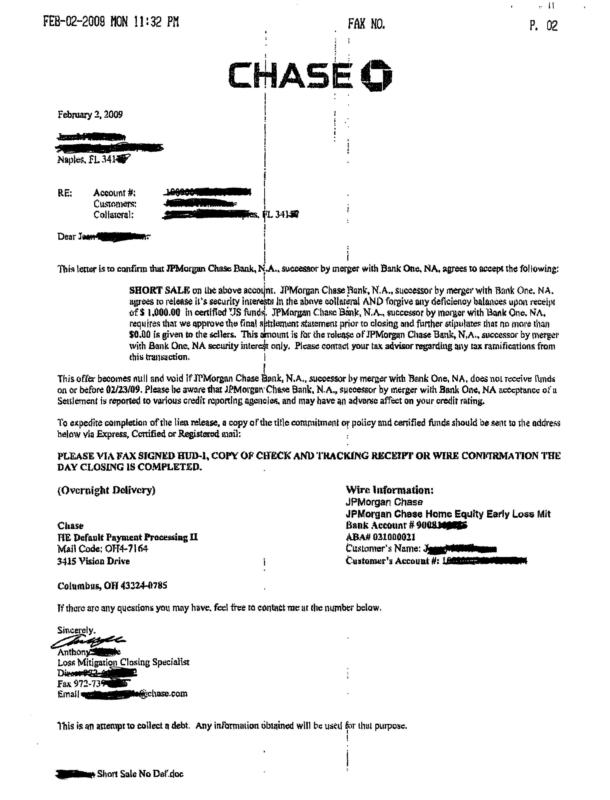What is a short sale? When giving lectures I like to use the definition as follows:
The sale of a real estate property for a price that is less than the total amount necessary to fully satisfy the actual present encumbrance (mortgage) indebtedness on the real estate property.
Often I see a different description, one that says, The sale of real estate when the lender accepts less than its mortgage amount and forgives borrower from paying the deficiency.
Which is correct? A look at the short sale acceptance letters lender's provide is going to tell us the real truth about short sales and forgiveness of deficiencies. This article will discuss examples of short sale acceptance letters. Read carefully, as you will probably be surprised!
Before going on, it is important that you have read and understood the concept of a promissory note and of a mortgage which secures the promissory note. See my article which explains it at A LAWYER'S EXPLANATION OF THE FORECLOSURE PROCESS.
Here is Example #1 of a short sale acceptance letter:

You will notice that the letter says this is an acceptance of a short sale. It says if all the things in 1 thru 5 are done the mortgage will be discharged and a release document will be provided to be recorded and the foreclosure dismissed. There is no mention of any cancellation of the promissory note. In this example there is no forgiveness of any deficiency.
See this next example from Bank of America the language is different.

Here, the letter says the deficiency balance will be reported to credit bureaus as "charge off" and the liability for the deficiency balance is "to be determined". This is confusing but what it means is that (1) there is a deficiency and (2) the lender will later determine what to do about the deficiency.
Next, is a 2 page letter from Countrywide.


This letter is the most definitive from the three presented. At paragraph 9 it clearly states that there is no promissory note required from the borrower. When taken with paragraph 13, it is clear that Countrywide will not pursue a deficiency judgment if the short sale closes. Thus in the example presented there is no deficiency that will be collected.
This last example from Chase was not as simple.

Here it says that Chase will release its security interest (the mortgage) and forgive any deficiency balance but then says that the payment of $1,000 is only for the release of the security interest only. This I would understand to mean the mortgage and not the promissory note. At the bottom of the page (but not part of the letter) is a notation "Short Sale No Def.doc". So I sent an email to Chase about this discrepancy and they confirmed - in writing - that it was a waiver of any deficiency.
Be very careful where you see language like "release and satisfaction" of the mortgage. What about the promissory note? That language almost always means that the lender is NOT giving a forgiveness of the financial obligation and has the option to pursue the deficiency for years to come. See FORECLOSURE DEFICIENCY JUDGMENT or SHORT SALE PROMISSORY NOTE or BANKRUPTCY - REVISITED.
In summary, it is most important that you read and question the short sale approval letter you get. A "release and satisfaction" of a mortgage is NOT necessarily a cancellation of the promissory note (forgiveness of deficiency). The letter from the lender should be clear and unequivocal and not subject to supposition or interpretation. If you are uncertain, don't be bashful - ask the lender for clarification and get it in writing!
NOTE: THIS ARTICLE HAS BEEN UPDATED AS TO BANK OF AMERICA SHORT SALE LETTERS at BANK OF AMERICA SHORT SALE APPROVAL LETTER CHANGES
Copyright 2009 Richard P. Zaretsky, Esq.
Be sure to contact your own attorney for your state laws, and always consult your own attorney on any legal decision you need to make. This article is for information purposes and is not specific advice to any one reader.
Richard Zaretsky, Esq., RICHARD P. ZARETSKY P.A. ATTORNEYS AT LAW, 1655 PALM BEACH LAKES BLVD, SUITE 900, WEST PALM BEACH, FLORIDA 33401, PHONE 561 689 6660 RPZ99@Florida-Counsel.com - FLORIDA BAR BOARD CERTIFIED IN REAL ESTATE LAW - We assist Brokers and Sellers with Short Sales and Modifications and Consult with Brokers and Sellers Nationwide! Shortsales@Florida-Counsel.com New Website www.Florida-Counsel.com. See our easy to find articles at Need Short Sale Information? - These Articles Probably Answer Your Question


Comments(23)